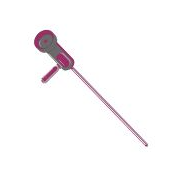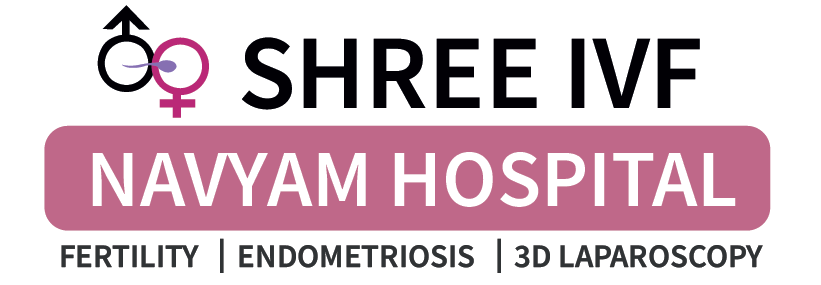We won’t let you loose HOPE
12300+
IVF procedures performed
4500+
Complicated Deliveries
10000+
IUI treatments performed
10500+
Laparoscopic endometriosis surgeries
Why Choose Shree IVF & Navyam Hospital ?

Overall Fertility Counselling

Enhanced Fertility Checkup

Fertility T

Fertility Preservation

Fertility Enhancement Surgeries

Laparoscopy Treatment

Hysteroscopy Treatment
Shree IVF & Navyam Hospital
Advanced 3D laparoscopy & Endometriosis surgery
Navyam Hospital is one of the best hospitals in Jaipur for...

Laparoscopic Surgery

Gynecology

Infertility Treatment

Maternity / Preganancy Care
Google Rating On 4.5

Meet Our Doctors

Dr. Ramswaroop Kumhar
Dr. Ramswaroop sir has been completed 8000+ Laparoscopy surgery and 200+ hospital visit as a surgen

Dr. Ramswaroop Kumhar
- Phone:+91 900144 7233
- Email:hospitalnavyam@gmail.com

Dr. Jyotima Saxena
Dr. Jyotima Saxena has 25 years of experience as a fertility specialist and gynecologist, with a success rate of over 500 cases.

Dr. Jyotima Saxena
- Phone:+91 9001447233
- Email:hospitalnavyam@gmail.com
Frequently Ask Questions
We have heard Egg collection Process is painful. Is it true?
The procedure is not painful as it is done under light sedation. But, at times it may cause mild discomfort. At our clinic, we use mild anaesthesia administered through an IV route which relieves discomfort.
What is the success rate of IVF?
Success rates strongly depend on the age of the patient, their condition, medical history and the line of treatment administered.
When should I opt for IVF?
The IVF procedure can be prescribed in cases where the other fertility treatments have failed, or if the chances of a successful pregnancy are higher with this method than with any other treatment. If there are no contraindications, the procedure can be carried out simply at the request of the couple by considering that precise time as the right time for IVF.
In which cases, IVF is performed?
Tubal-peritoneal factor- Violation of the patency of the fallopian tubes leads to the fact that the egg cannot penetrate the uterine cavity. In this case, you can elther try to restore patency using a surgical laparoscopic operation or perform IVF and Implant an already developing embryo into the uterine cavity. Male factor- This diagnosis is made when the quality of sperm is not high enough. If the number of healthy active sperm is too low to conceive a healthy child, it is better to resort to ART treatments like IVF, IUI, ICSI, etc. Endometriosis - Mild forms of endometriosis usually respond to surgery and hormonal treatment. If, after the therapy, pregnancy does not occur, then the doctor sends the couple for an IVF procedure. Age-related infertility- Age plays a vital role when we talk about deciding the right time for IVF. With this factor of infertility, it is better to supplement the standard IVF procedure with ICSI and assisted hatching methods. Anovulation- Anovulation is usually treated with simpler methods, such as hormonal stimulation combined with IUI. But if it's unsuccessful, you can always use the IVF method. Unexplained infertility - If it is not possible to establish an accurate diagnosis, and the therapy is unsuccessful, then the doctor may advise the couple to resort to the IVF procedure.
How does the IVF process work?
In this process, the female egg is taken out under anaesthesia and fertilized with the husband's sperm in the lab. The embryo formed after 3-5 days is transferred back to the uterus.
How much time does an IVF cycle take?
1. One day for check-up/Pre-IVF preparation
2. 15 days for IVF procedure (Second Visit)
3. Embryo transfer
Fertility Treatments Offered by Navyam Hospital
We are dedicated to providing comprehensive fertility treatments to couples across the country. Our IVF centers in India offer a diverse range of fertility solutions designed to meet the unique needs of each patient. From IVF procedures to advanced techniques like Laser Assisted Hatching (LAH), we specialize in enhancing fertility for both men and women. When necessary and recommended, we also provide access to donor programs. All our treatments are carried out under the supervision of experienced specialists, ensuring strict compliance with legal and ethical standards.

Infertility Workup
A set of diagnostic tests conducted to create a tailored and effective treatment plan for couples facing infertility challenges.

Sonography
A diagnostic test that uses high-frequency sound waves to examine a woman's reproductive organs before, during, and after fertility treatments.

Semen Analysis
A medical procedure used to assess the production, quantity, quality, and other characteristics of sperm in the semen.

In vitro fertilization
A procedure in which fertilization and embryo development take place outside the uterus, followed by the transfer of the embryo into the uterus.

ICSI ( Intracytoplasmic Sperm Injection Treatment )
A specialized form of in vitro fertilization (IVF) in which sperm is directly injected into the female egg to facilitate fertilization.

Laser assisted hatching
A medical procedure that supports IVF treatment and enhances the likelihood of successful embryo implantation.

Laproscopy
A diagnostic and therapeutic procedure that effectively addresses conditions like endometriosis, ovarian cystectomy, myomectomy, correction of anatomical abnormalities, and lysis of uterine adhesions, among others.

Blastocyst culture and embryo transfer
As part of the IVF or ICSI process, this step involves allowing the fertilized egg (embryo) to develop for 5 to 6 days. Once fully developed, the embryo is then transferred back into the woman’s uterus to promote implantation and pregnancy.

Hysteroscopy
Hysteroscopy tests aid in identifying potential causes of infertility, while hysteroscopic surgery can be used to remove fibroids, polyps, or correct other anatomical issues.

Intrauterine insemination ( IUI )
The process in which the highest quality sperm from the male partner is directly injected into the female's reproductive system to fertilize the eggs.

DNA Fragmentation Index (DFI)
The Sperm DNA Fragmentation Index (SDFI) is used to assess any damage to the sperm's genetic material or DNA.

Micro TESE
Micro-TESE (Micro Testicular Sperm Extraction) is a procedure used to retrieve sperm directly from the male partner's testicles when there is low sperm quality or quantity, or when no sperm is present in the ejaculate.

PGTA
This test helps identify chromosomal abnormalities in an embryo, providing valuable information to assist with treatment planning.

Cryopreservation
This process can be performed for oocyte cryopreservation (egg freezing), sperm cryopreservation, and embryo cryopreservation (for future frozen embryo transfer).

Embryo Donor
IVF with embryo donation is a third-party reproductive method that involves using the sperm and egg from donors to create an embryo.

Ovum Donor
This procedure is performed when the female partner is unable to produce healthy eggs for fertilization. In this case, eggs from an egg donor are collected and used for fertilization.

Donor Sperm
If there are significant abnormalities in the male partner's sperm count or morphology, this procedure can be performed to fertilize the female's egg using sperm from a donor.
Team of Fertility Speacialist
Related Fertility Awareness Video
What Patient Talk About Navyam Hospital & Dr. Ramswaroop Kumhar
Reality of Patiant

Pregnancy Calculator Tools for Confident and
Stress-Free Pregnancy Planning
As you prepare to begin your journey toward parenthood, understanding your fertility cycle is essential. Our range of pregnancy tools can assist you in tracking and identifying the optimal times for conception. These customized pregnancy calculators empower you with valuable insights, making it easier to stay informed and boosting your chances of achieving a successful pregnancy.
Pregnancy Calculator
Pregnancy Conception Calculator
Period Calculator
Best Gynecologist
in Jaipur
Dr. Ramswaroop Kumhar Navyam Hospital
With ongoing advancements in medical science, both public perception and the approach of gynecologists themselves have evolved—particularly as patients today are more informed and proactive. Women are increasingly seeking clarity and asking in-depth questions about the latest innovations being used in their treatments.
Studies have shown that gynecological conditions can significantly impact a woman’s overall quality of life. This highlights the critical need to prioritize women’s health, assess the severity of each case, and determine the effectiveness of the treatments offered. In response to this growing need, Jaipur Navyam Hospital now offers cutting-edge solutions such as laparoscopic and hysteroscopic procedures, alongside modern medical therapies. These minimally invasive techniques are increasingly replacing traditional surgical approaches for a wide range of gynecological concerns. Our specialists focus on delivering advanced care that ensures faster healing, minimal discomfort, and shorter hospital stays for our patients. Read More…






